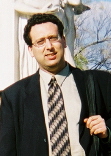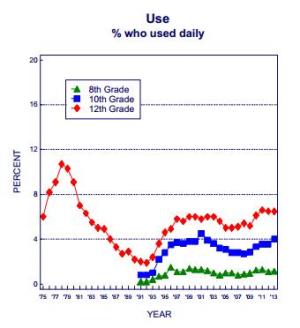David Borden, Executive Director

The drug news for 2013 was actually fairly good, at least overall. Use of most drugs was steady or even declined. One of MTF's two press releases noted that youth cigarette smoking has declined! Young people have also become more cautious when it comes to use of synthetic drugs as well, according to the other release -- the direction of change in use rates varies by age group, but it's a positive sign. Much of the discussion in the media, however, was about marijuana use. Use by seniors declined in 2013, relative to 2012, but use of marijuana by 8th and 10th graders increased.
As a chart from the MTF report that I've pasted below shows, though, it didn't increase by very much. More importantly, it didn't reach a level out of line with the rates surveyed for those age groups during the past few decades. It's a far lower rate, in fact, than when MTF first started surveying. The most recent qualitative discussion about marijuana use was published last February, in a historical report using data through 2012. It soberly noted both upturns and downturns in annual and daily use levels among the age students surveyed: including declines during 2006 through 2008; increases in 2010; mixed developments in 2011; and decreases or leveling off in 2012. All of the 2013 numbers for marijuana are very close to those found for 2012.
Enter the drug czar. In remarks accompanying a video prepared for the media, Office of National Drug Control Policy director Gil Kerlikowske proclaimed, "These increases in marijuana use over the past few years are a serious setback in our nation's efforts to raise a healthy generation of young people." Kerlikowske took a swipe at marijuana legalization in Colorado and Washington too, an article from the McClatchy news service notes, also claiming medical marijuana has made it easier for young people to obtain the drug. But there is mixed evidence for that at best. For example, a recent study published in the American Journal of Public Health found that medical marijuana laws "have not measurably affected adolescent marijuana use in the first few years after their enactment," though noting that what happens in the short-term does not necessarily tell us what may happen in the long term.

Kids and marijuana use is just one of many drug policy areas in which mainstream media, despite some general improvement and increased interest in our side of the issue often still falls short. Here are some others:
- Synthetic drugs are said to be growing in popularity, even as they arguably become less popular. An article in the Florida Sentinel described "bath salts" drugs as "increasing popular" in the article's header. One had to scroll down well into the article to find out that Florida has seen a one-third decrease in emergency room mentions in the state for bath salts.
Florida law allows for up to five years imprisonment for possession of more than three grams of synthetic drugs -- a draconian policy that reporting like this unwittingly helps to foster. No mention is made in most such stories of the possibility for reducing the dangers of synthetic drugs through regulation rather than prohibition -- an approach taken in New Zealand, for example.
- The attorneys general of 28 states have asked the FDA to reverse its approval of the drug Zohydro, a new form of the opioid painkiller hydrocodone. Articles about Zohydro have failed to note other articles reporting that crackdowns on pain pill diversion have cause heroin use to rebound, however, or to discuss the ways that some patients would benefit from Zohydro, for example by not chronically taking the other ingredient commonly included included in such medications, acetaminophen, which can damage the liver.
Of course they also failed to discuss "opiophobia," the hesitance physicians often have to prescribe the needed doses of these medications or to prescribe them at all, even when they are painfully needed by the patients, such pain itself having other health harms if not treated well. Even as use of opioids has grown, undertreatment of pain also continues for many patients in many cases, and law enforcement has played a role in creating and sustaining that.
- Lawmakers, including some who normally are good on drug policy, recently asked the US Sentencing Commission to toughen sentences for growing marijuana on public lands. Media reports reports failed to note the harsh sentences federal law already for provides marijuana growing, or the dubiousness of proposals to lengthen sentences in the country with the world's highest incarceration rate. Undoubtedly it will remain illegal to cultivate marijuana on public lands under legalization, at least without a permit and proper procedures for it. But that doesn't mean that longer prison terms is the way to address it, now or in the future.
- Media have often gotten the nature of the federal-state conflict on marijuana legalization wrong. An otherwise strong article in the Washington Post last August, for example, carelessly claimed that the Colorado and Washington legalization initiatives "directly violate the federal Controlled Substances Act, which prohibits the production, possession and sale of marijuana."
As I pointed out in a series of blog posts after the election, most legal scholars don't believe that the initiatives violate federal law or could be preempted in federal court, although one couldn't say for sure unless they got tested in court. Our federalist system is specifically designed for states to have different policies on the books than the federal government does, so long as their policies don't prevent the federal government from using its own resources to enforce federal policies. And the state laws don't do that, nor do they involve state employees in growing or distributing marijuana themselves. All they're doing is defining how the state will or won't use its own enforcement resources.
Notably, no federal official has sought to overturn a state medical marijuana law in the 17 years since one was first enacted. The kinds of misconceptions that this kind of careless misstating on an important point of law in this evolving issue can have a chilling impact on the decisions made by lawmakers in other states as well as localities.
- Perhaps the saddest type of story, that has continued with no change yet, is that of the mundane local drug bust. We don't even usually cover them here. But one recent story that I've selected at random is that of a New Jersey woman accused of marijuana in the mail. The reported 18 pounds is a lot, but it was probably worth just a fraction of the $72,000 that police in their typical act of exaggeration claimed it could get on the street. Maybe there's some reason I don't know that it could.
But most unfortunate part of this -- and I don't blame the reporter for this at all, but it's important -- is the lack of reflection on whether it actually reduces the drug supply or actually helps anyone to do these busts (it doesn't), or what it means to arrest and incarcerate people, in many cases subjecting them to lengthy prison terms, over a substance that a majority of Americans now believe should actually be legal, and that more believe should at least be decriminalized. It's a moral issue that seems to be lost on most actors in the criminal justice system, though not all.
As we approach 2014, I've highlighted some continuing shortcomings in mainstream media coverage of drug issues, in part to illustrate why we believe it is still up to reformers to fund and make our own media -- a drumbeat sounding clear and true against the fear and misinformation, turning a few more heads every year and normalizing rational debate. I hope you will support our organization to financially be able to continue in 2014.
This work by StoptheDrugWar.org is licensed under Creative Commons Attribution-ShareAlike 4.0 International
Comments
Mainstream Media
The Mainstream Media cowers to its Corporate advertising Sponsors . Promoting Cannabis legalization and common sense is bad news for the Corporate drug testing agenda . After all , Cannabis is the #1 culprit of a failed drug test . Corporate control and compliance follows a worker home to their bedroom or back porch . Unless you happen to be the CEO , you get no breaks . When is the last time that the KOCH brothers were offered a choice between their jobs and a clean drug test ? An alcoholic Judge will lock you up for years for getting a buzz from a plant . The hung-over D.A. will agree . Hypocrisy abounds . David , Ethan , George , Mark , and those names I`m forgetting , these are the front line folk`s . Real Media .
Add new comment